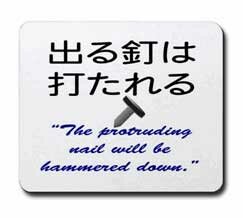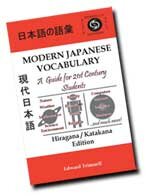
Home
Departments
Basics:
Modern Japanese Vocabulary:
A Guide for 21st Century Students
"File this little book under 'secret weapon'. It's really that good." --Amazon.com customer review
E d 's J a p a n e s e B l o g
September 06, 2008
Word of the Day
度胸
(どきょう)
nerve; courage
Usage Examples:
度胸を試す to test one’s courage
度胸のある courageous
度胸のない timid; fearful
August 31, 2008
Word of the Day:
無駄
(むだ)
waste
Usage Examples:
無駄足 (むだあし) a fool’s errand; a pointless trip
無駄話 (むだばなし)idle chatter
無駄骨を折る (むだぼね を おる)to make vain efforts
無駄書き (むだがき)idle scribbling
無駄死に (むだじに)a pointless death
無駄遣い (むだづかい)waste
August 27, 2008
From Japanese Culture from A to Z: Business, History, Politics, Sex, and More
This video includes a brief introduction to kaizen…
August 23, 2008
The gaijin debate in Japanese
Every now and then, I still hear Americans state that they could never really master Japanese because it is just “too difficult.”
Poppycock. Videos like this prove that non-Japanese---including Westerners---can successfully master Japanese.
Watch this video for inspiration as well as language study. The foreigners in this video all handle the Japanese language competently. The Australian woman is kind of annoying---but I suspect that she would be annoying in English as well.
The key word from this video is:
帰化(きか)naturalization
August 20, 2008
Word of the Day
下品な
(げひん な)
coarse; vulgar; low
下品な行動 vulgar conduct
下品な話 coarse language
下品な印象を与える to make a coarse impression
下品なテレビ番組 a low-brow television program
August 17, 2008
Word of the Day
潜在
(せんざい)
potentiality; dormancy
Usage examples:
潜在自我 the subliminal self
潜在需要 latent demand
潜在能力 potential capabilities
潜在購買力 latent purchasing ability
August 13, 2008
Word of the Day
未利用の
(みりよう の)
unused
Usage examples:
未利用資源 unused resources
未利用地 (みりようち) vacant land
August 09, 2008
Word of the Day
剽悍な
(ひょうかん な)
intrepid; daring; fierce
Usage examples:
剽悍な戦いぶり a fierce way of fighting
剽悍な少女 an intrepid girl
剽悍な語り口 an intrepid way of talking
剽悍な顔つき a bold expression
剽悍な風体 a bold posture
August 04, 2008
Watch your language
From my YouTube channel: My take on learning and using profanity in a foreign language. This one could obviously apply to any language; but I believe it is especially relevant for Japanese.
August 02, 2008
Word of the Day
命
(いのち)
life
This is a basic word, but it has a number of idiomatic uses that you may not be a aware of.
Usage examples:
命拾いする (いのちびろい する) to have a narrow escape (from death)
命懸けの (いのちがけ の) of life and death; perilous to one’s life
命乞いをする (いのちごい を する) to beg for one’s life
命からがら with bare life
命取りの (いのちとり の) fatal; mortal
命綱 (いのちづな) a lifeline
Japan's Longest Day
If you are interested in Japanese history as well as the Japanese language, you might check out the documentary Japan’s Longest Day. The movie explores the closing days of World War II from the Japanese point of view. For those of you who are still working on your listening skills, the movie also has subtitles.
I was able to find this documentary at my local public library. My guess is that you will be able to as well.
July 27, 2008
The Japanese language and wartime
I have written before about Jack Seward, Occupation-era Army veteran and author of numerous books about Japan and the Japanese language. Seward was one of the relatively small number of Americans whom the U.S. government trained in the Japanese language during World War II.
Here is an article about Bryan M. Battey, who graduated from high school in 1942, and shortly thereafter attended the U.S. Navy school of foreign languages. Like Seward, Battey’s wartime training in the Japanese language evolved into a lifelong fascination with Japanese culture.
The article notes that Battey had strong motivation to keep his grades high while in the Navy languages school:
"We were tested regularly," he [Battey] wrote in a private memoir. "Motivation was high. Failure meant Okinawa, or Iwo Jima."
July 23, 2008
The Japanese government gets serious about promoting Japanese abroad
I think this report is evidence that Japan has gotten past the whole "hen na gaijin" concept. (For those of you who are aren't aware, 変な外人 is a somewhat pejorative way of referring to a gaijin who is truly comfortable speaking Japanese.) During my last trip to Japan, I found that the Japanese now expect visitors to speak Japanese while visiting their country---and this goes for Americans as well.
The Japanese government has stepped up its efforts to promote Japanese studies abroad as well, as this article from the Yomiuri Online describes.
This effort may be partly a response to China, by the way. China has also launch some high-profile programs of late to promote the study of Mandarin abroad.
July 20, 2008
A bit about Japanese dialects....
I've been YouTubing again. Here is a response to a reader question about handling Japanese dialects like Kansai-ben, etc.
In the video, I mention my recent experience with Mikawa-ben in the Nagoya area.
July 17, 2008
A reader question about future book plans
Dear Ed:
I noticed that you haven’t written a kanji book yet. Do you have any plans to write one?
Aimee Weiss
Honolulu, Hawaii
Dear Aimee:
A kanji book has been a frequent topic during my regular brainstorming sessions.
I make it a rule to only produce books that I think add a unique angle to Japanese language studies. Right now, basic student needs in the kanji realm have been answered by some good publications. First there is the timeless Kanji & Kana by Wolfgang Hadamitzky & Mark Spahn. (This text should be in the library of every Japanese language student.)
For kanji flashcards, both Tuttle and White Rabbit Press have brought some excellent products to the market.
I don’t want to create something that merely duplicates these efforts.
If I do produce a kanji book in the future (and I would bet that I will at some point) it will hopefully answer some need that these other products don’t answer.
As a small publisher, you have to shoot for the niches.
July 13, 2008
Word of the Day
価値なし
(かち なし)
without value
This word appeared in a recent news headline, as North Korea rejected a proposal from the president of South Korea as worthless:
北朝鮮、韓国大統領提案を「価値なし」と拒否
Supplementary vocabulary:
北朝鮮(きた ちょうせん) North Korea
韓国 (かんこく) South Korea
大統領 (だいとうりょう) president
提案 (ていあん) proposal
拒否する (きょひ する)to reject; to turn down
July 10, 2008
Word of the Day
名コンビ
(めいこんび)
ideal combination
Example usage:
あの二人は名コンビです。 Those two make an ideal pair.
July 09, 2008
Word of the Day
有効に使う
(ゆうこう に つかう)
to make the best use of; to use effectively
Technically, I suppose that I should call this the "phrase of the day"---as it really is more than one word.
This expression comes in especially handy in business, where making the optimal use of everything (time, resources, etc.) is always of top importance.
Usage examples
時間を有効に使う to make the most of one's time
お金を有効に使う to use money effectively
資産を有効に使う to use assets effectively
Supplementary vocabulary
時間 (じかん) time
お金 (おかね) money
資産 (しさん) asset; assets
July 08, 2008
Word of the Day
大胆な
(だいたん な)
bold; daring
大胆な発表 (だいたん な はっぴょう)a bold announcement
大胆な行動 (だいたん な こうどう) daring behavior
July 07, 2008
Word of the Day
卑劣な
(ひれつ な)
mean; contemptible
Usage Example:
卑劣な行動 (ひれつ な こうどう)contemptible conduct
卑劣なテロ (ひれつ な テロ) vile terrorism
July 06, 2008
Word of the Day
匹敵する
(ひってき する)
to be a match for, to be equal to
Usage Example:
上位モデルに匹敵する性能 performance that corresponds to a superior model (of product, machine, etc.)
Supplementary vocabulary:
上位(じょうい) performance; rank
性能 (せいのう) capacity; power
July 03, 2008
Word of the day
恐慌
(きょうこう)
panic; scare
Here is a word for these uncertain economic times. The following compounds may come in handy when discussing the stock and commodity markets of late:
Usage examples:
金融恐慌 (きんゆう きょうこう) a financial panic
恐慌相場 (きょうこう そうば) panic market (stocks/commodities, etc.)
恐慌状態にある (きょうこう じょうたい に ある)to be in a state of panic
July 02, 2008
Word of the Day
海外勤務者
(かいがい きんむしゃ)
overseas employee
If you work for a Japanese company outside Japan, you will almost certainly come across this term at this point. 海外勤務者 refers to an employee who has been assigned to a temporary overseas position. These are the individuals frequently called “advisors” or “coordinators” in the overseas branches of Japanese companies.
June 29, 2008
A chance to study in Japan
I have had a lot of time on the ground in Japan; but all of it has been for work purposes. I never had a chance to go to Japan as a student----partly because I didn’t start to study Japanese until near the end of my undergraduate career. By the time my Japanese was up to speed, I was about to graduate.
Nowadays, of course, many high school students have the opportunity to study Japanese, and can therefore identify their interest in the language much earlier.
Here is a story from the Philadelphia Inquirer about a recent high school graduate, Rebecca Muth, who won a Japan Foundation Language Study Program for a two-week trip to Japan. I can’t think of a more interesting experience for the summer between high school and college (if you are interested in Japan, that is.)
Rebecca Muth has apparently acquired a high degree of proficiency in the Japanese language at the age of 17. I was still three years away from my first Japanese class at that age; Ms. Muth has already had studied Japanese for three years.
June 23, 2008
Podcast: The Unification of Japan
- This broadcast takes a brief look at the most influential warlords in Japanese history: Oda Nobunaga, Toyotomi Hideyoshi, and Tokugawa Ieyasu.
- A brief look at life in Japan under the Tokugawa shoguns.
June 23, 2008
Sega Yakuza 2 fans want their game in Japanese
I will start by admitting that I am hopelessly behind the times when it comes to video games. (My knowledge pretty much ends with the arcade games of the early 1980s---Asteroids, Space Invaders, etc.)
Yakuza is a realistic video game that leaves my arcade games of 25 years ago in the dust. The original version of the game had a Japanese-language soundtrack; but Sega dubbed it over with an English one. This was a gamble on Sega’s part, of course. On one hand, the English-language soundtrack compromises authenticity; but on the other hand, how many U.S. and Canadian players of the game understand Japanese?
It seems that fans have spoken, and they want the game to be in Japanese. (The fans did, however, say that they want subtitles.) Therefore, the next version of the game, Sega 2, will feature a Japanese-language soundtrack.
June 18, 2008
The Brazilian presence in Japan
Here is an article in SFGate about the Japanese presence in Brazil. During the late nineteenth and early twentieth centuries, thousands of Japanese left their country to seek their fortunes in Brazil.
Many of these immigrants’ descendents still live in the Sao Paulo area. I was in Sao Paulo for an extended business trip about ten years ago, and I visited the city’s Nihonmachi. This is a worthwhile stop if you have a chance to visit Brazil. (Brazil supposedly has the largest Japanese population outside of Japan.)
There is also a large Brazilian presence in Japan these days. Brazilians have been traveling to Japan to work as temporary laborers for the past twenty years. They tend to cluster around Japan’s automotive plants.
When I was in the Nagoya area last week, I heard a great deal of Portuguese in shops and restaurants. In nearby Toyota City, Portuguese signs are more common than English ones; and the local bookstore contained a whole shelf full of Japanese-Portuguese dictionaries.
I suspect that most of these materials were for the benefit of Brazilians who are studying Japanese. However, the study of Portuguese has increased over the past decade in Japan, as Brazil has become a popular location for Japanese manufacturing operations.
June 14, 2008
Back from Japan
If you have been wondering where I’ve been, I have just gotten back from a two-week business trip to Japan. I am exhausted and glad to be back.
If you are planning any travel within Japan, may I suggest that you pack lightly. This past week I had to drag four pieces of luggage through train stations throughout Japan. Not a very enjoyable experience. This was especially challenging during the morning rush hour in Osaka. I would bet that there are still some Japanese laughing at the silly gaijin who was apparently trying to transport half of his worldly possessions through the subway systems.
Which brings us to the word of the day: 鮨詰め(すしづめ), or “packed like sushi”. This figurative expression is often used to describe trains and subway systems.
鮨詰めの電車 = a crowded train “packed like sushi”
June 01, 2008
Word of the Day
歯止め
(はどめ)
brake; stop
common usage pattern: 歯止めを掛ける = to apply the brakes; put a stop to
From the news:
子どもの肥満増加に歯止めか 米CDCの調査
国民の肥満傾向に危機感を募らせる米国で、05─06年に調べた2歳から19歳の肥満人口の割合が、25年ぶりに前回調査と同じ水準にとどまったことが分かった。
Supplementary vocabulary:
国民(こくみん) people; citizens
肥満傾向(ひまん けいこう) tendency toward obesity
危機感を募らせる (ききかん を つのらせる) to cause a sense of crisis
人口(じんこう) population
割合(わりあい) proportion
前回(ぜんかい) last time
水準(すいじゅん)level
May 25, 2008
Word of the Day
禁煙
(きんえん)
giving up smoking; stopping smoking
According to this news article, various personal habits can be spread from person to person. So if your spouse quits smoking (or develops a weight problem) you are likely to do the same.
禁煙と肥満は家族や友人に伝染 米ハーバード大調査
禁煙は喫煙の習慣と同様、人から人に伝染するという研究結果を米ハーバード大学医学部の研究チームがまとめ、22日の米医学誌ニューイングランド・ジャーナル・オブ・メディシンに発表した。研究チームは昨年、肥満は人に伝染するという調査も発表しており、禁煙にも同じパターンがあることが分かった。
Supplementary Vocabulary List
肥満(ひまん)corpulence; overweight
家族(かぞく) family
喫煙(きつえん)smoking (tobacco)
習慣(しゅうかん)custom; habit
伝染する(でんせん する) to spread; to be contagious
研究結果(けんきゅう けっか) research results
と同様(と どうよう) the same as
May 18, 2008
Word of the Day
秘話
(ひわ)
secret story; secrets
This word is featured in the headline of an online article about the royal wedding in the UK:
英女王の初孫が結婚、秘話を芸能誌に1億円で売却か
Supplementary Vocabulary:
英女王(えいじょおう)British queen; queen of England
初孫(しょそん)first grandchild
結婚(けっこん)wedding
売却(ばいきゃく)sale
May 12, 2008
NOT A DIFFICULT KANJI
無
This is the kanji with a negative attitude, as its meaning is “not, negation.” The kun reading of this character, na(i), is most often written in hiragana in contemporary Japanese texts. This is also true of its conjugated kun forms, like naku naru 無くなる (=get lost; go missing; to die). There are two on readings, MU and BU. These are located at the beginning of many compound words, and the high frequency of both readings makes the distinction between MU and BU mostly a memorization task:
MU-beginning words:
無色(むしょく)colorless
無口(むくち)taciturn
無休(むきゅう) no holidays; never close (said of a store or business
BU-beginning words:
無事(ぶじ)safe and sound
不気味(ぶきみ)eerie
無用心(ぶようじん)unsafe; lacking caution
Words that end with the kun reading:
A few words, like mottainai 勿体無い (=wasteful) end with the kun reading.
Words that end with the on reading:
Words that end with the on reading of 無 are rare:
皆無(かいむ)nothing; nil
有無(うむ)existence; presence
虚無的(きょむてき)nihilistic
May 04, 2008
北半球
きたはんきゅう
Northern Hemisphere
The excerpted article below discusses the phenomenon of winter. Included are the Japanese words for the Northern and Southern Hemispheres.
冬は四季の一つで、一年中で最も寒い季節である。北半球では1月が一番寒さが厳しい。南半球は季節が逆になるので7月が冬となる。
日本の気象庁では一日の最低気温が0℃以下の日を冬日(ふゆび)、また、その日の最高気温が0℃未満の日を真冬日と呼んでいる。およそ四国九州以北では、このような日は一月を中心に十二月から三月にかけて生じるから、このあたりが冬の範囲にはいる。なお、南半球では6月・7月・8月
Source: http://ja.wikipedia.org
真冬日 まふゆび dead winter, the middle of winter
四季 しき four seasons
一年中 いちねんじゅう all year round
一番 いちばん number one ; the most
寒さが厳しい さむさ が きびしい the cold is severe
南半球 みなみ はんきゅう Southern Hemisphere
逆になる ぎゃく に なる to be reversed; to be opposite
未満 みまん under; less than
中心 ちゅうしん the center
範囲 はんい range; scope
April 26, 2008
"So many people in Russia studying Japanese"
Russia and Japan haven’t always been on the friendliest of terms. Tension between the two countries began in the late nineteenth century, when both wanted to control Manchuria and Korea. Then there was the Russo-Japanese War of 1904-5, which the Japanese won. Since the end of WWII, Japan and Russia have had a dispute about the ownership of the South Kuril Islands.
Nevertheless, this doesn’t seem to be hurting the popularity of Japanese language studies in Russia, as this article notes:
[Japanese Prime Minister] Fukuda earlier visited a school in Moscow to watch a Japanese class being taught.
After meeting with pupils from the lycee, he said: "I am very surprised that so many people in Russia are studying Japanese."
There are currently 14 schools in Moscow teaching the language.
"The Japanese government intends to continue efforts to popularize the national language and expand programs for Russian-Japanese exchanges," he said.
Read the complete article here.
Tutorial: The Acquisition of Profits
利潤の獲得
rijun no kakutoku
Nihon no kigyoo wa tashu-tayoo na seihin no seisan o okonau koto ni yotte rijun o kakutoku shi, seichoo shimasu.
日本の企業は多種多様な製品の生産を行うことによって利潤を獲得し、成長します。
"Japanese companies acquire profits and grow through the production of a wide variety of products."
April 20, 2008
A Japanese-language article about campus life in the U.S.
The university discussed here is the University of Cincinnati, which happens to be my alma mater:
大学生らが銃の携帯を主張 キャンパスでの護身に必要と
米オハイオ州シンシナティ(CNN) 米国の大学キャンパスなどで銃乱射事件が続発している事態を受け、一部学生らの間で最近、自衛のために銃を携帯したいとの声が高まっている。
Read the complete article here:
Key Vocabulary:
大学生ら (だいがくせいら) university students
銃の携帯 (じゅう の けいたい) carrying guns
主張する (しゅちょう する) to insist on
護身 (ごしん) self-defense
必要 (ひつよう) necessary
銃乱射事件 (じゅうらんしゃ じけん) random shooting incidents
続発する (ぞくはつ する) to occur one after another
自衛 (じえい) self-defense
April 14, 2008
Another good use for Japanese language skills….
Determining what flavor of potato chip you want at a Japanese food mart:
Because he knew Katakana, the Japanese alphabet, Carmel Middle School eighth-grader Allan Schaefer was able to read the different flavors of potato chips at Sakura Mart in Indianapolis. He chose curry flavor over French salad.
Schaefer was among a group of eighth-grade students in a Carmel Middle Japanese class who had a hands-on experience last week with the Japanese language and culture. (continue...)
Teaching Japanese in Shelbyville, Indiana
I don’t know if you have any interest in teaching Japanese to high school students. Here is a profile of Nihongo student who learned Japanese and did exactly that…
In high school, Steve VonWerder wasn't voted "most likely to teach Japanese."
"Most language teachers learn their language in high school," VonWerder said, "but I didn't study any foreign language in high school."
In fact, the Shelbyville High School teacher didn't show any interest in learning a foreign language until he traveled to Japan as a missionary at age 24.
"I wanted to teach English in a foreign country and do Christian work," VonWerder said. VonWerder learned Japanese in six months through immersion. For him, learning the language was a necessity, not a novelty.
"I had to learn Japanese so I could buy my bananas," VonWerder said. "How could I pay my bills if I couldn't speak the language?" (continue reading…)
April 08, 2008
Is Japanese enrollment declining at this Maine college?
For those of you who are interested in who is studying what language, this article may be interesting. The sample here is admittedly a small one (students at Bowdoin College, in Brunswick, Maine). But a sample is a sample. Now let’s dig in.
The article states outright that Russian language enrollments are declining. This is an old story. Russian language studies enjoyed considerable prestige during the Cold War, and a big surge of popularity during the Gorbachev era. In 1990 many Americans believed that Russia was going to become the next economic superpower. We now know that history turned out differently.
The article doesn’t exactly say that Japanese enrollments are declining, but that they are small to begin with. This doesn’t surprise me. Japanese is a difficult language, and it has none of the chic appeal associated with some European languages like Italian and French. Japanese is a language for dry, practical people who study business, accounting, and engineering. So what’s wrong with that? As the professor who is interviewed in the article reminds us, Japan is still the world’s second largest economy, China notwithstanding.
My guess is that the Japanese language will never enjoy stratospheric levels of popularity in the U.S. There is too much competition from other languages these days (Spanish, Chinese, Arabic, etc.), and too many other countries occupy so much of the news. But Japanese remains an extremely useful language, and my guess is that it will remain so well into the foreseeable future.
April 06, 2008
Word of the day:
倍
(ばい)
-times, fold
U.S. presidential hopeful Barack Obama is setting records on the fundraising front, as this article notes:
選挙資金競争でもオバマ氏優勢、3月はクリントン氏の倍か
米大統領選の民主党候補指名争いで首位を走るオバマ上院議員の選対本部は3日、今年3月の献金額は4千万ドル(約41億2千万)に達したとの暫定数字を発表した。献金者は44万2千人以上で、うち21万8千人以上が初の寄贈者としている。
一方、ライバルのヒラリー・クリントン上院議員の陣営は、3月の選挙資金は約2千万ドルであることを明らかにした。
Read the complete article here..
Supplemental vocabulary:
米大統領選 (べいだいとうりょうせん) U.S. presidential election
民主党候補指名争い(みんしゅとう こうほ しめい あらそい) fight for the nomination of the Democratic Party
首位を走る (しゅい を はしる) to take the lead
献金額 (こうけんがく)donation amount
暫定数字 (ざんてい すうじ)tentative number
貢献者 (こうけんしゃ) donor
寄贈者 (きぞうしゃ) contributor; donor
選挙 (せんきょ)election
競争 (きょうそう)competition
The many ways to say "to wear" in Japanese
I just couldn't resist that swipe at wearing neckties....
March 30, 2008
Word of the day
寸前
(すんぜん)
immediately before; right before
The headline below contains some disturbing news. Apparently a large ice shelf at the South Pole is on the verge of collapse due to global warming.
南極の大規模棚氷、温暖化で崩壊寸前
Supplementary vocabulary:
南極(なんきょく)South Pole
大規模 (だいきぼ)large scale
棚氷(たなごおり) ice shelf
温暖化 (おんだんか)(global) warming
崩壊 (ほうかい)collapse
March 25, 2008
Word of the Day
揺るぎない
(ゆるぎない)
firm, unshakable
The following article describes U.S. Vice President Cheney’s trip to Israel. While in Israel, the VP affirms the U.S. commitment to U.S.-Israeli ties
米副大統領がイスラエル訪問 「揺るぎない」関係維持を約束
Supplementary vocabulary
米副大統領 (べいふくだいとうりょう) U.S. Vice President
訪問 (ほうもん) visit
関係維持 (かんけい いじ) maintenance of relations
約束する (やくそく する) to promise
March 21, 2008
Word of the day
非難する
(ひなん する)
to criticize; to rebuke
The article hyperlinked below discusses U.S. House of Representatives Speaker Nancy Pelosi’s meeting with the Dalai Lama, and her rebuke of China. (Click here to read the complete article)
ペロシ米下院議長がダライ・ラマと会談、中国を非難
Supplementary vocabulary:
ペロシ米下院議長 (ペロシ べいかいんぎちょう)U.S. House of Representatives Speaker Nancy Pelosi
会談(かいだん)conversation; talk
中国 (ちゅうごく) China
March 19, 2008
Chinese or Japanese?
And here your host addresses that age-old question: should I study Japanese or Chinese?
More about Japanese corporations
Here is an example that I culled out of a business textbook, for those of you who are interested in Japanese corporate life.
The excerpt describes the successes that the Japanese economy experienced in the postwar era, including the successful weathering of two oil shocks:
第二次大戦後、日本は奇跡的ともいえる高度成長を遂げ、経済大国と呼ばれるまでになったが、その成長を支えた主役は企業であった。その後、日本は二度のオイル・ショックも見事に乗り切り、その強さがあらためて認識された。 (continue...)
Word Focus:
失敗
Sometimes you fail, and that is exactly what the word失敗(しっぱい), or “failure” is all about. The following excerpt discusses the failure of a civilian rocket that was launched (and subsequently crashed) in New Mexico: (continue...)
表面化する
The word 表面 = surface. And the suffix 化 conveys the idea of becoming something. When you add 表面 and 化 and then make this combination a Sino-Japanese verb with the addition of する, the result is 表面化する, which means to come to the surface. (continue...)
Having a High Head:
頭が高い
zu ga takai
There are times when you are better off to quit when you're ahead, because a situation or a person is very difficult to handle. Seki no yama 関の山 describes a situation in which even the best effort will result in either a maintenance of the status quo, or possibly a deterioration in conditions: (continue...)
Modern Japanese Vocabulary: A Guide for 21st Century Students
We hope that this site is helping you learn Japanese! If you can spare a $1 to help cover expenses, we say Doomo Arigatoo!
(View the Doomo Arigatoo List of site sponsors.)














